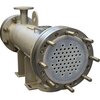Silicon Carbide
Pressureless sintered silicon carbide is almost universally corrosion resistant.
Pressureless sintered silicon carbide is almost universally corrosion resistant.
Brochures
pdf - 3.82 MB
-
Silicon carbide has outstanding properties
It shows outstanding thermal conductivity as well as extremely high compression, tensile and flexural strengths.
Pressureless sintered silicon carbide is almost universally corrosion resistant. It resists to all common acids (e.g. hydrochloric acid, sulfuric acid, hydrobromic acid, and hydrofluoric acid), to bases (e.g. amines, potash and caustic soda), to all solvents, and to oxidizing media (e.g. nitric acid).
-
Manufacturing process
Silicon carbide for process equipment applications is manufactured by the sintering process. First the silicon carbide parts are shaped by extrusion (tubes) or cold isostatic pressing (plates and blocks). Then they are machined (plates and blocks).
Finally, they are sintered under vacuum at a very high temperature. This demanding process confers its ultimate corrosion resistance, its extreme hardness, and its mechanical properties to our CORROSIC® material.
-
Properties and corrosion resistance
Properties
With thermal conductivity of 130 W/m.K, silicon carbide outperforms most of the materials used for the construction of corrosion-resistant process equipment.
Corrosion resistance
Pressureless sintered silicon carbide is almost universally corrosion-resistant. It resists against all common acids (e.g. hydrochloric acid, sulfuric acid, hydrobromic acid, and hydrofluoric acid), bases (e.g. amines, potash and caustic soda), all solvents, and oxidizing media (e.g. nitric acid).


